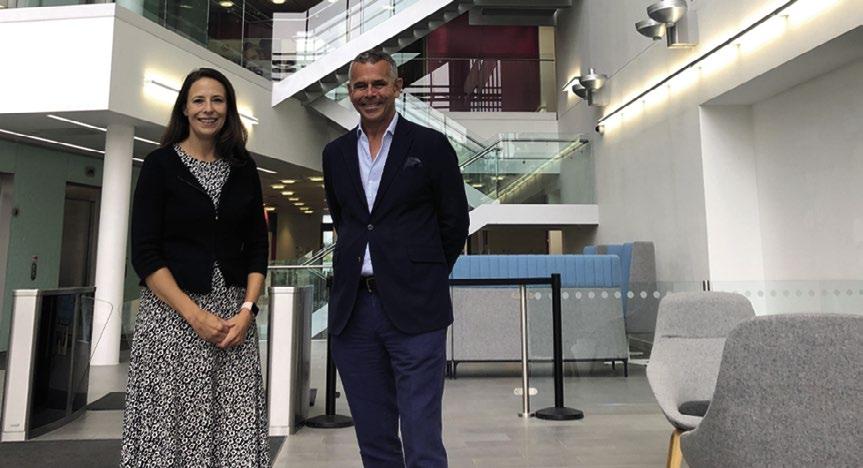
18 minute read
can tame inflation
Money Matters
Bank of England, it’s down to you to tame inflation
The economic backdrop facing Chancellor Jeremy Hunt was one of uncertainty and unease, with the UK economy confronted by 11.1 per cent inflation, an inevitable recession and the urgent task of restoring financial credibility to the government.
Jeremy Hunt was facing a £33 billion current account deficit at a time when consumer disposable income continues to be eroded and millions of Britons already grappling with a cost of living crisis.
All eyes were on him and how the new Conservative leadership team would put forward a plan to support low-income households and balance the books while at the same time restore credibility to the government following the disaster of the September mini-budget.
The Chancellor did not disappoint and managed, through sleight of hand, to achieve his aims with a tweak here and there, coupled with freezing tax allowances and some new energy profit levies.
The result was a mini budget that announced £55 billion of fiscal tightening with the aim of reducing the deficit over the next five years - 51 per cent of the squeeze being driven by tax hikes, 49 per cent by spending cuts.
While the headlines will point to a plethora of tax rises and spending cuts, Jeremy Hunt has loosened fiscal policy over the next two years, cushioning the impact of the coming recession, with the tightening occurring in the four years from 2024/25. The onus is therefore back on the Bank of England to tame inflation and bring it back to the two per cent target.
Although the £55 billion package of tax hikes and spending cuts was as expected, it forms the largest tightening of fiscal policy since the Osborne ‘austerity’ Budget in 2010, highlighting to markets that the partnership of Rishi Sunak and Jeremy Hunt will take their financial discipline more seriously than their predecessors.
The immediate aftermath of the autumn statement saw investors give a tentative seal of approval to the budget. The pound fell by more than one per cent but remained well above September’s all-time low and not far below the recent three-month high. This is a massive contrast to what was seen with Kwasi Kwarteng’s budget, with the rally in the run-up and a muted reaction suggesting that this government has restored a level of UK credibility.
With almost 30 per cent of UK government debt being held by foreign investors, the muted response within the gilt market indicates a seal of approval from investors in relation to the path laid out by the Chancellor.
The Autumn Statement, in which Chancellor Jeremy Hunt outlined his plans to reduce the UK’s fiscal deficit, seems to have had a cautious welcome from the markets. Wealth management specialist Jason Stather-Lodge pictured, managing director of OCM Wealth Management, assesses the Chancellor’s statement.
The involvement of the Office for Budget Responsibility, which presented fiscal forecasts to accompany the plans laid out by Mr Hunt, also helped to reassure investors as the budget appears to have been designed to avoid any potential shock to sterling or gilt markets.
With inflation running at a 41year high alongside a need for fiscal restraint, a return to austerity is likely to add further pressure on the economy as consumer spending falls and consumer confidence levels remain near record lows. The OBR has laid out expectations for the UK economy to shrink by 1.4 per cent in 2023, with the Bank of England expected to take interest rates up to around four per cent to restore stability to consumer prices.
With energy prices contributing to higher than expected headline inflation levels, consumer focus was on the energy price guarantee which is helping to shield households and
OUR VIEW: OCM WEALTH MANAGEMENT
We believe that what the Chancellor managed to achieve was positive in the short term, noting the market reaction has been positive. He has pushed most of the cuts out to after the next general election, managing to convince the wider market that the Conservatives were back in control. If that was the aim, it has therefore been a success.
There are many critics including us who believe that he should have gone further in simplifying the tax system. However, as we want economic stability first and foremost and that is how the market has reacted, we are happy and accept that paying more tax is required to balance the books.
Liz Truss and Kwasi Kwarteng are now firmly destined to be remembered for all the wrong reasons in historical trivia and Jeremy Hunt and Rishi Sunak have managed to restore credibility in the short term. The challenges facing the Chancellor will be vast in the coming years with fiscal tightening and we have to hope that we do not see a heavy rise in unemployment above expectations and growth below expectations - that will have deep consequences for the UK economy and the level of borrowing, resulting in a deeper, longer recession.
The ability to spend to stimulate economic growth rests heavily on the Bank of England’s ability to bring inflation back to target, although this requires the government to show a level of solidarity to ensure that the interest rate hikes are not offset by increased fiscal outlay.
We are definitely on target for UK interest rates to reach a peak of about 4-4.5 per cent (better than six weeks ago when forecasts briefly hit 6pc) in 2023 but the expectation is that inflation will fall in 2023 and employment will remain strong (compared to historical reference points) despite the headwinds.
If that comes true, we can realistically say the economy has normalised and the era of cheap money and no inflation has ended.
businesses from price shocks. An announcement to slightly reduce the level of protection on offer from April 2023 will be a concern to many, as annual household energy prices are set to increase up to £3,000, further squeezing disposable income levels amd dragging more consumers into energy poverty.
Without the current levels of government support, headline inflation levels are expected to have risen to around 13.8 per cent, highlighting the impact that a reduction in support could have moving forward. With it we are now expecting inflation to fall considerably in the second half of 2023 which will, when it happens, make everyone feel better.
As a result of the rising cost of living, combined with fiscal restraint and slowing economic growth, many analysts now believe the UK is already in a recession which they anticipate lasting for four straight quarters, with unemployment set to increase to almost five per cent by the end of 2024, indicating further pain to come.
Helping businesses to prepare for the economic storm ahead
Global professional services firm KPMG is supporting companies across the region to navigate the increasingly complex economic challenges they are facing as they continue to target growth. Pete Rowe, Senior Partner for KPMG’s Milton Keynes practice, explains.
Following a challenging few years, it now looks as if the UK is heading for a recession which could see the economy shrink by more than two per cent by the end of 2023. So what can local businesses do to prepare for challenges ahead?
KPMG’s recent CEO survey found that more than two-thirds (69pc) of UK CEOs believe a recession will make it harder to rebound from the pandemic and 63pc believe it will disrupt anticipated growth over the next three years.
Many of our local businesses are having to make hard choices now to help their businesses to weather the challenging conditions they face. For our army of start-up businesses and entrepreneurs, the slowdown in venture capital and private equity investment means looking for new ways to attract funding and conserving cash to better position themselves for a new funding round as the economy recovers.
It is not all doom and gloom, however. Our local transactions teams have had a busy year with plenty of deals still happening as good businesses attract the investment they need and the local businesses we speak to are confident there is a light at the end of the tunnel. So what are the areas on which businesses are focused as they plan to weather the economic storm ahead? n COSTS Getting a handle on a changed cost situation and taking costs out of a business to protect profitablity is a key focus.
There is not one solution. It will depend on the business - and potentially even the sector - but cost improvements that a business should be thinking about will include revisiting finance arrangements and renegotiating debt interest with lenders, reviewing and renegotiating contracts and better data insights to fully understand the profitability of your product range, markets or customers. n TAX The Chancellor put tax at the heart of his recent Autumn Statement in an effort to create stability, but for many businesses, the tax system can feel complex, and not the valuable lever it can be to grow or invest in a business. Often tax is the area that is addressed at year end and not considered up front as part of the decision making process. Key initiatives to look at in attempting to unlock capital include making an R&D claim or looking at the super-deduction which allows companies investing in qualifying new plant and machinery assets to cut their tax bill by up to 25p for every £1 they invest. n TALENT The ability to recruit, retain and upskill staff will be crucial to the future success of our local businesses.
Now is the time for businesses to identify the knowledge and capability gaps that they have now and are likely to have in future and to engage with their workforce to make sure they are equipped with the skills to overcome them to help to future proof their business.
Having a strong employer proposition to recruit the talent needed to take a business forward is vital. Across our offices in Milton Keynes and Watford, we are continually assessing our employee value proposition to ensure our firm represents the values of our people

Pete Rowe and creates a sense of belonging. n ESG Environmental, social and governance initiatives are not only growing in importance for investors, customers and regulators. They are also important to help improve financial performance and driving growth. Now is not the time to be pausing planned ESG initiatives. Delivering a sustainable recovery from the pandemic and recession and making decisions that address our societal challenges will benefit us all in the long run.
As we head into what will be a difficult winter, I am certain that our local business community is ready to weather the challenges ahead and be in a stronger position to benefit from the upturn when it comes.
Pete Rowe is Office Senior Partner for KPMG in Milton Keynes and its 125 staff based near Bletchley Park.

GSSARCHITECTURE
Committed to investing in our people’s future
National architecture practice GSSArchitecture, whose head office is in Northamptonshire, is celebrating their latest award successes following a great evening at the Northamptonshire Business Excellence Awards.
GSS were delighted to win the Employer of the Year award, which recognises employers that have created an outstanding workplace based on a set of values that has led to a committed, effective and motivated workforce.
Hosted by TV presenter and actor Paddy McGuinness at the Northampton County Cricket Ground, the event saw a variety of businesses arrive to celebrate local successes from around the county.
The awards were judged by Nick Hewer, star of BBC’s The Apprentice; Shalom Lloyd, founder of Naturally Tribal Skincare Ltd; Rachel Mallows, founder and managing director of The Mallows Company Limited, and Ian Nicholas, global managing director of Reed. Speaking about GSS’ submission for Employer of the Year, they said, “This submission was very considered and robust, providing an in-depth insight into what has been done to create a fantastic working environment with a true sense of belonging.”
As recognised Investors in People Gold Standard, GSS offer educational and training opportunities to all members of the GSS team and are committed to investing in the future of their people. The practice has a long history of providing opportunities, training, and support in the profession, with numerous members of staff currently undertaking studies in a range of disciplines.
The practice were also finalists in the Land and Development award for their work at Northampton Museum and Art Gallery. GSS’ work at Northampton Museum consisted of a considerable expansion, involving a new courtyard extension which is strategically placed to allow the museum to extend into the adjoining vacant former council office buildings, including an old Gaol Block.
The work was part of the town’s Cultural Quarter masterplan and has more than doubled the publicly accessible area of the museum.
Tom Lyons, senior partner at GSSArchitecture, said: “We are always striving to invest in our people and ensure that they are progressing in both their professional and personal lives so it is fantastic to have won Employer of the Year which is a great achievement for the practice.”

GSSArchitecture colleagues celebrate their success with TV presenter Paddy McGuinness, the awards host
n If you are interested in how GSSArchitecture can help you with your career, or would like to get in touch in relation to any upcoming projects you may be considering, visit www. gssarchitecture.com
qoob
Your Business Expo: A different way of doing business
Businesses signing up for Your Business Expo are being given a wealth of exclusive benefits to ensure each makes the most of the opportunities generated from the event.
Headline sponsor qoob has created a portal with exclusive access for exhibitors at the event which will be held at Hangar One at Sywell Aerodrome in Northamptonshire on February 8.
The qoob group, which has been working with Your Business Expo organiser Business Times - sister publication to Business MK - since 2021, has put together a marketing pack which includes a range of free resources from graphics for use on social media to templates for press releases and flyers.
Matthew Rigby-White, managing director of the full service marketing agency, said: “The aim of the exhibition is to reach, engage and connect so we want to help make sure this happens. It is important that exhibitors start looking at ways to promote the Expo so, as soon as they sign up, they will be given access to the portal.
“It costs money to exhibit but often exhibitors believe it is simply down to the organisers to promote the event. I totally disagree - it is down to everybody to share information about the event with their network.
“If each exhibitor even got just two or three people to attend, we would soon have more than 200 people in the room. It really makes good business sense. They want to see a return on their investment but if they do not tell their network they are going to




Matthew Rigby-White
be exhibiting then it is a missed opportunity.”
Your Business Expo aims to create opportunities for quality sales leads, to meet with key decision-makers from business across Northamptonshire and to increase awareness of each exhibitor’s individual brands.
Insightful workshops delivered by industry experts on key business topics will be run throughout the day. The workshops will include one run by specialists from
qoob who will be offering solutions to businesspeople looking to get better returns from their marketing. “We believe our specialist knowledge has real value. We want to share this information with as many people as possible to help businesses to overcome challenges and find fresh solutions,” said Matthew. “Many of us have either exhibited It at or attended is down to everyone to a business exhibition. Your Business share information Expo is with their network promising a different way to do business.” GRIFFITHS AIR CONDITIONING
Heat pumps: Proven solution for the energy crisis
As we head towards the end of 2022 and the start of a new year, we reflect on what the past 12 months has brought us and look towards the future. In the world of construction, and especially the building services sector, the emphasis has been on energy efficiency and the fight against climate change.
The UK government has realised that we cannot go on burning fossil fuels so, from 2025, no new homes will be allowed to have mains gas connected to them.
There is much discussion about what will provide the heating and hot water in our houses but one technology that is already proven - and Griffiths have been installing for more than a decade - is heat pumps.
It is not rocket science; the principle behind the operation of a heat pump has been around for a long time. Heat pumps work in the same way as the fridge in your kitchen, collecting heat from one place - the air or ground - and moving it somewhere else - into your home heating and domestic water systems - using a refrigeration system.
Griffiths were the first Northamptonshire installers to gain Microgeneration Certification Scheme status for heat pumps back in 2008. Since then hundreds have been installed, with most also being regularly maintained by Griffiths.
Another recent change affecting both heat pumps and air conditioning is the use of R32 refrigerant gas, which is much less harmful to the environment if it should leak than its predecessors.
It also has superior energy efficiency.
At this time of year, the engineers at Griffiths are very busy keeping people warm with a wide range of heating products including air and ground source heat pumps, and air to air heat pumps (conventional air conditioning).
In addition, the Griffiths service team are making sure that regular maintenance is carried out to heating, cooling and ventilation equipment throughout Northamptonshire, an essential part of keeping it at peak condition and spotting possible problems at an early stage.
Service plans or one-off servicing are also available for equipment that has not been installed by Griffiths.

n Contact Griffiths on 01536 420666, via their website at www.griffithsaircon.co.uk or visit their Energy Efficiency Centre showroom at 111 High Street in Burton Latimer, open Monday-Friday 9am-5pm.
HCR HEWITSONS
‘The perfect springboard’: Law firm celebrates its investment in the region
Law firm HCR Hewitsons have opened a new office, bolstered their offerings to the region with new talent and received top rankings in the latest leading legal directories.
The new office, which comes after months of anticipation for the Central England team, arose from client demand for seamless service across a wider range of legal specialisms with an extended geographical reach.
Based in the Avon building on the same site as the University of Northampton’s Waterside Campus, the investment demonstrates the firm’s commitment area, with joint head of office Charlotte ThorntonSmith calling it ‘the perfect springboard for continued growth’.
Indeed, the growth has continued, as new partner David Davies joins the corporate team. Although the firm’s highly respected international practice is already well-recognised, David, who has extensive in Europe, builds the firm’s capabilities even further.
“HCR’s work with clients reflects the approach it takes in business - pragmatic and sensible while being creative and ambitious,” he said. “I look forward to contributing towards the development of what is already a leading practice in the Central England region and beyond.”
The team continue to grow following the firm’s latest round of promotions. HCR Hewitsons gains a new partner with Stephanie Dennis in the agriculture and rural affairs team as well as two new legal directors, with Lynne Adams in employment and immigration and Michael Campbell in real estate,

following the firm’s latest round of promotions.
Equally impressive is partner Tonina Ashby’s qualification as a Notary Public - one of only around 770 in England and Wales, bringing a new specialist service for the office that will aid in the execution of international transactions.
With this year’s independent legal directory rankings solidifying the team’s place in the world of law, there is yet more to celebrate as they Charlotte Thornton-Smith and Dominic Hopkins, joint heads of office at HCR Hewitsons’ new Central England headquarters in Northampton
reach the end of the year.
Joint head of office Dominic Hopkins said: “This has been a year of continued excitement for us at HCR Hewitsons - as we approach the end of the year we are looking to the future as much as back on our achievements. The investment in the new office shows our commitment to not only our clients here but also our belief in the region. I am excited to see what the future holds and to build on this year’s successes.
“I would like to particularly thank our clients, who have been with us for all of these exciting changes, and for whom we strive to provide the best service every day.”
Charlotte Thornton-Smith added: “This year has been hard for all of us in a number of different ways, so I am delighted we have this good news to share. We are so pleased that this year has been a successful one and one in which we have been able to improve our offering to clients.”


